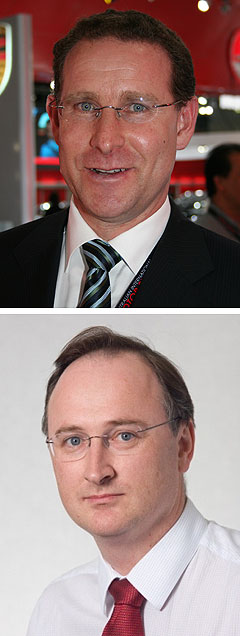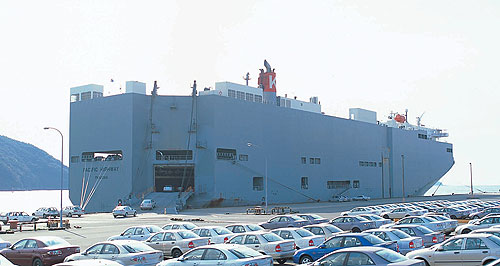Make / Model Search
News - General News - GovernmentUsed-car import rules set to come under scrutinyOld issues: Motor companies are getting set to lodge objections to a suggestions for a relaxation of second-hand car import rules. Federal motor industry review set to examine Australia’s vehicle design rule changes27 Aug 2014 UPDATED: 02/09/2014THE Australian motor industry is shaping up for another wide-ranging review, this time potentially opening a can of worms on second-hand vehicle and new-car parallel imports. The federal review of the Motor Vehicle Standards Act 1989 comes hard on the heels of this week’s Productivity Commission (PC) report on the automotive manufacturing industry, but the focus will be on reform of design regulations governing all new vehicles sold in Australia, as well as used vehicles brought in from overseas. Opposing sides to this argument are getting set to lodge submissions to the review which is also likely to hear representations calling for Australia to bring its Australian Design Rules (ADRs) more into line with international standards such as the UN ECE format used in Europe. Guidelines for the review are likely to be released within days by infrastructure assistant minister Jamie Briggs, who has been waiting for the PC report to be tabled first. The PC has already weighed into the issue of second-hand imports from an economics point of view, saying progressively relaxing restrictions would deliver benefits in the form of lower prices and/or improved features and greater choice for vehicle buyers.  From top: AAA executive director Andrew McKeller and FCAI chief executive Tony Weber.The Motor Vehicles Standards Act review is expected to address the issue from a safety, environmental and consumer relations point of view. From top: AAA executive director Andrew McKeller and FCAI chief executive Tony Weber.The Motor Vehicles Standards Act review is expected to address the issue from a safety, environmental and consumer relations point of view.The act has not been overhauled since 1989, and many within the industry expect the federal government to be under pressure to hit the reset button on the current ADR system for cars, trucks and motorcycles. This might include opening up the country to second-hand imports, in a similar fashion to New Zealand where large volumes of used cars are shipped from Japan. Federal industry minister Ian Macfarlane has indicated the government is not planning to relax the used-car rules any time soon, saying: “The government has no intention of allowing Australia to become the dumping ground for other countries’ old second-hand vehicles.” Australia’s motor industry peak body, the Federal Chamber of Automotive Industries (FCAI), is dead against any relaxation of second-hand import rules, on multiple grounds including safety, emissions and warranty issues. FCAI chief executive Tony Weber said Australia had the most competitive new-car market in the world, bringing the latest environmental and safety technologies for consumers. “With the significant year-on-year improvements in vehicle technology, it goes without saying that a newer motor vehicle fleet is better for consumers as newer cars are safer, more environmentally friendly and more reliable,” he said. “The high level of competition is benefiting consumers, with a vast majority of models sold in Australia at a cheaper price than other right-hand drive markets.” The Australian Automobile Association (AAA) – the peak body for motoring clubs such as the NRMA, RACV and RACQ – says it is not against second-hand imports, but only on the proviso that the vehicles meet current ADRs. AAA executive director Andrew McKellar told GoAuto that his organisation had an open mind on used-car imports, and could see there could be some consumer benefit from cheaper used cars. But he said AAA would be opposed to any relaxation of safety ADRs for those vehicles, saying safety was its paramount concern. “It is a matter of principle for us – we would not support any change that would reduce safety standards of cars imported into Australia,” he said. This requirement would have the effect of ruling out many older used cars from Japan, as they were not equipped with technologies such as electronic stability control (ESC) – mandatory under Australian passenger car ADRs. Mr McKellar said the AAA supported the trend towards bringing Australia’s motor vehicle rules into line with international requirements. But he said Australia would have to address the issue of the states adding “another level of complexity” to vehicle rules, such as Victoria’s decision to apply a mandatory ESC rule ahead of the federal deadline. Many major players in the motor industry are well advanced on their submissions for the Motor Vehicle Standards Act review, and a report is likely within months, perhaps before the end of the year. The Victorian Automobile Chamber of Commerce (VACC) released a statement saying it rejected the possible introduction of used car imports and criticised the PC report for including the recommendations given it was “outside the terms of reference for the review”. While the safety of older used cars was a key issue for the VACC, it also highlighted potential complications with spare parts, finance, insurance and technical information issues that could push up the cost of service and maintenance. VACC executive director David Purchase called on the federal government to speak directly with the automotive industry prior to implementing any new policies based on the findings of the report. “As expected, the Australian Automotive Manufacturing Industry Report by the Productivity Commission has proved to be a complete waste of time,” he said. “It’s delivered little of substance, it’s out of touch with the industry and proved economists have a complete lack of understanding about the automotive industry.”“The Federal Government has issued its initial response to the Report and VACC hopes the Abbott Government will talk directly to the automotive industry and listens to our views, as we are the ones who really know what’s going on. “With car making on its way out, it is time to focus on the majority of the automotive industry, the Retail, Service and Repair sector. Three out of four employees in Australia’s automotive industry, or approximately 320,000 people, work in the RSR sector. "We will be lobbying the Government intensely and calling on it to reject many of the Commission’s views.” In a statement, the VACC also called for the abolition of the Luxury Car Tax, while pushing the government to consider its proposal to boost LPG production in Australia as a means to revitalise car-making communities, a plan it says has been “totally ignored” by the PC.  Read more26th of August 2014  Inquiry formalises call for end to Australia’s car industryFinal Productivity Commission report tabled in federal parliament12th of August 2014  Australians ‘ripped off’ on luxury car pricing, dealer saysBrisbane-based dealer slams FCAI claims that car prices here are not overpriced24th of February 2014  AADA fears flood of used importsDon’t relax laws on used vehicle imports, says AADA |
Click to shareGeneral News articlesResearch General News Motor industry news |









Facebook Twitter Instagram